
The Royal Air Force (RAF) is the United Kingdom's air and space force. It was formed towards the end of the First World War on 1 April 1918, becoming the first independent air force in the world, by merging the Royal Flying Corps (RFC) and the Royal Naval Air Service (RNAS). Following the Allied victory over the Central Powers in 1918, the RAF emerged as the largest air force in the world at the time. Since its formation, the RAF has played a significant role in British military history. In particular, during the Second World War, the RAF established air superiority over Hermann Göring's Luftwaffe during the Battle of Britain, and led the Allied strategic bombing effort.
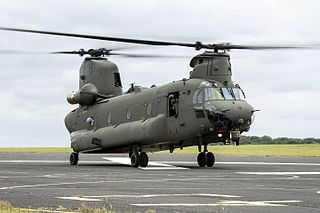
Royal Air Force Odiham or more simply RAF Odiham is a Royal Air Force station situated a little to the south of the village of Odiham in Hampshire, England. It is the home of the Royal Air Force's heavy lift helicopter, the Boeing Chinook, and of the King's Helicopter Flight (TKHF). Its current station commander is Group Captain Matt Roberts.
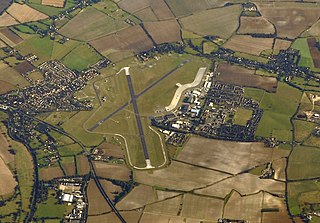
Royal Air Force Benson or RAF Benson is a Royal Air Force (RAF) station located at Benson, near Wallingford, in South Oxfordshire, England. It is a front-line station and home to the RAF's fleet of Westland Puma HC2 support helicopters, used primarily for the transportation of troops & equipment. Flying squadrons comprise No. 33 Squadron flying the Puma, No. 22 Squadron which provides operational evaluation and training for all aircraft in Joint Helicopter Command and No. 28 Squadron, which is the combined Puma and Boeing Chinook HC6A training unit. Other units include the Oxford University Air Squadron and No. 6 Air Experience Flight, both flying the Grob Tutor T1 light training aircraft used for student and cadet flying training. The National Police Air Service and the Thames Valley Air Ambulance are also based at the station, both operating Airbus H135 helicopters.
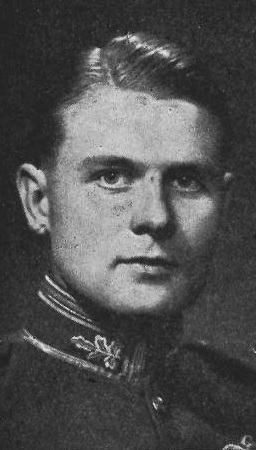
Marshal of the Royal Air Force Samuel Charles Elworthy, Baron Elworthy, was a senior officer in the Royal Air Force. He served as commander of a squadron of Blenheim bombers and then as a station commander during the Second World War. He became Chief of the Air Staff in the mid-1960s and implemented the cancellation of the TSR-2 strike aircraft and the HS681 military transport aircraft programmes. He also became Chief of the Defence Staff in which role he oversaw the evacuation from Aden in November 1967 and had to respond to the growing crisis in Northern Ireland in the late 1960s.
Air Chief Marshal Sir Joseph Charles French,, often known as Sir Joe French, is a retired senior Royal Air Force officer who was the last Air Officer Commanding-in-Chief RAF Strike Command (2006–07).
Air Marshal David Walker, was a senior Royal Air Force officer. He was the Deputy Commander, Allied Joint Force Command at Brunssum in the Netherlands from 2011 to 2013, having previously served for over three years as Deputy Commander, Allied Air Component Command at Ramstein in Germany. Prior to that appointment he was Air Officer Commanding No. 1 Group in the United Kingdom.

No. 22 Group Royal Air Force is one of six groups currently active in the Royal Air Force (RAF), falling under the responsibility of Deputy Commander-in-Chief (Personnel) in Air Command. Its previous title up until 2018 was No. 22 (Training) Group. The group is responsible for RAF training policy and controlling the Royal Air Force College and the RAF's training stations. As such, it is the direct successor to Training Group. 22 Group provides training to all three service branches of the British Armed Forces; namely the Royal Air Force, the Royal Navy, and the British Army.
Air Marshal Sir Edward “Tap” Gordon Jones, was an officer in the Royal Air Force for 34 years, from 1935 to 1969. He commanded a squadron of obsolescent biplane Gladiator fighters during the Greek Campaign in the Second World War, where he shot down five Italian Fiat CR.42 fighters. He served in mainly operational posts in Europe until he retired. Unusually, he never served a post in the Air Ministry or the UK Ministry of Defence.

Air Chief Marshal Sir Frederick Rosier, was a senior Royal Air Force commander.
Air Commodore Graham Clarke Bladon was a British air officer of the Royal Air Force, who initially joined the Royal Naval Air Service during the First World War, becoming an RAF officer in 1918. He went on to hold various commands up to and throughout the Second World War, and served as the first Commander of the Royal Ceylon Air Force from 1951 until 1958.

Air Commodore Ian Richard William Stewart is a retired British Royal Air Force officer. His last posting was as the United Kingdom National Military Representative at Supreme Headquarters Allied Powers Europe. He was Commandant Air Cadets between 2008 and 2010, and Air Commodore, Royal Air Force Reserve from 2014.

The Joint Special Forces Aviation Wing (JSFAW) is a Royal Air Force (RAF) and British Army joint service organisation that coordinates the provision of aviation support to the United Kingdom Special Forces.
Air Commodore Cathcart Michael Wight-Boycott, was a British fighter pilot during the Second World War and a senior Royal Air Force officer during the post-war years. In 1961, Wight-Boycott became the 10th Commandant Royal Observer Corps.
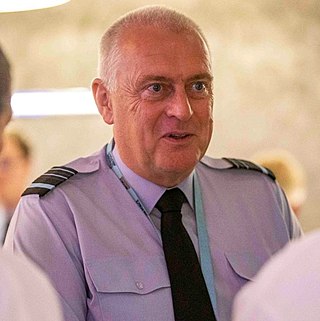
Air Marshal Sir Barry Mark North, is a retired senior Royal Air Force officer, who served as Deputy Commander (Personnel) at RAF Air Command. A helicopter pilot, North has held command appointments at all levels, notably No. 78 Squadron in the Falkland Islands, the Special Forces Flight as a squadron leader and the newly established No. 83 Expeditionary Air Group in the Middle East as an air commodore.

Air Chief Marshal Sir Andrew Douglas Pulford, is a retired senior Royal Air Force (RAF) commander. A helicopter pilot with operational service in Northern Ireland, the Falklands War and Iraq War, Pulford commanded RAF Odiham and No. 2 Group, and served as Assistant Chief of Defence Staff Operations, before taking up the post of Deputy Commander-in-Chief Personnel at Air Command and Air Member for Personnel in 2010. He became Chief of the Air Staff on 31 July 2013, retiring from the Royal Air Force on 12 July 2016.

Air Marshal Gregory Jack Bagwell, is a retired senior Royal Air Force (RAF) commander who served as Deputy Commander (Operations) at RAF Air Command.

Air Vice-Marshal Christopher James Luck is a British charity executive and retired Royal Air Force officer. He was Commandant of the Royal Air Force College Cranwell from 2013 to 2016, and Commandant of the Joint Services Command and Staff College from 2017 to 2019. Since 2019, he has been CEO of the Shaw Trust.
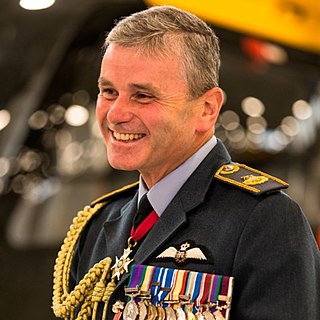
Air Marshal Andrew Mark Turner, is a former senior Royal Air Force officer and helicopter pilot.
At the end of the Cold War in 1989, the Royal Air Force (RAF) structure was as follows:

Air Vice-Marshal Philip Jeremy Robinson, is a decorated British pilot and senior Royal Air Force officer.













